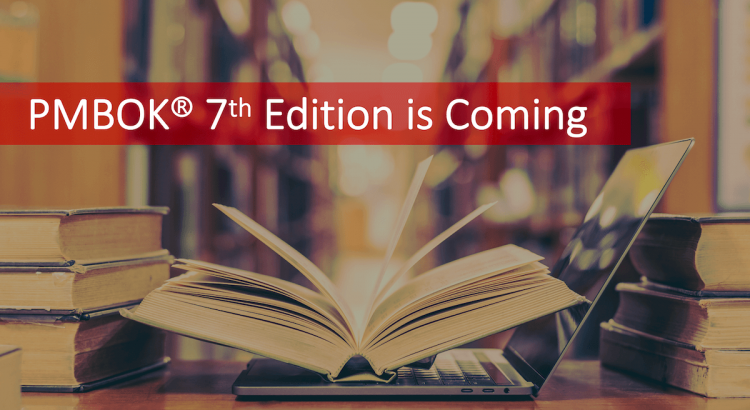Project Management Institute PMI announced the PMBOK® 7th Edition exposure draft in January 2020 for the review of the project management community. PMBOK 7th Edition will be released on the 1st of August, 2021. If you are looking to get your PMP certification, PMI PMBOK is one of the most important resources while preparing for the PMP exam. Most of the PMP training providers prepare PMP study materials and resources based on the PMBOK content. Therefore, the PMBOK guide 7th edition will be the guide for PMP and CAPM certification tracks of PMI and the training providers will be updating their materials for the PMP exam prep based on this change.
- Check out our PMP® Online Class Virtual Training that will help you fully prepare for the PMP certification exam!
- You can also check out our self-paced PMP® Certification Training.
Do you want to hear what our students say about our PMP courses? You can watch this video!
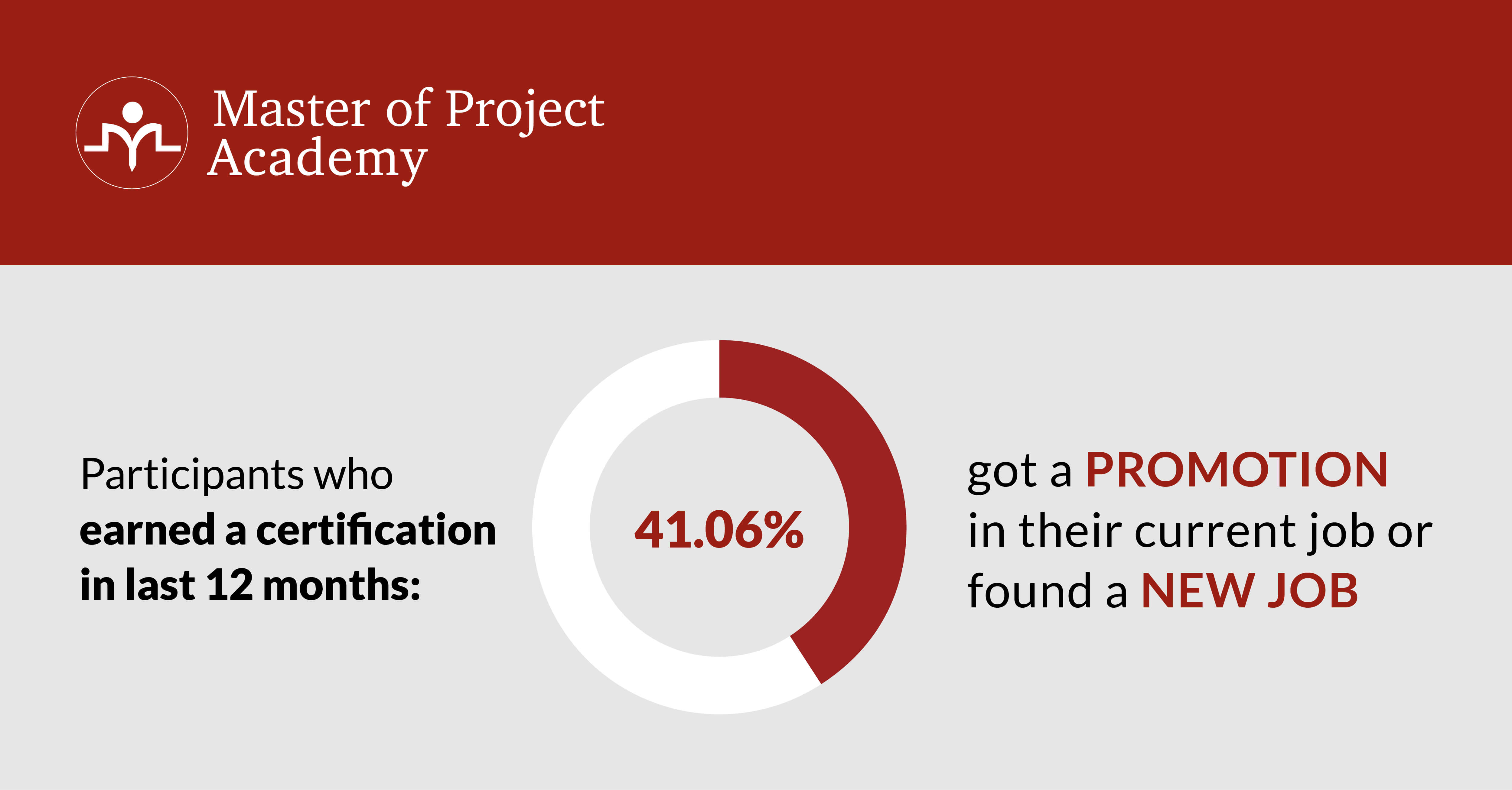
Attend our 100% Online & Self-Paced One-Hour Free PMP Training.
We have gone through the PMBOK 7th Edition Exposure Draft, and PMI resources regarding PMBOK 7th changes and tried to detail what is changing in the new PMP certification PMBOK.
When will the PMBOK 7th Edition be published?
Based on PMI pages, PMI PMBOK guide 7th Edition is scheduled for release on the 1st of August 2021. However, the PMP exam will not be based on PMBOK 7th Ed right after release. We are expecting that the PMP exam will be based on PMBOK 7th Ed by Jan 2022. This will give time to training providers to update their training content based on the new PMBOK changes.
Why is PMBOK® changing?
Until now, PMBOK was mainly focusing on waterfall project management techniques. However, with the fast pace of technology, competition is harsher than it was ever before. Product life cycles are shorter and the requirements of the product or project can change over time depending on the progress of the project.
With conventional project management approaches, it is not possible to welcome rapidly changing requirements to the projects. That is why agile project management methods and approaches emerged in the 2000s. These agile frameworks started to be adopted by many organizations in project management, especially in the IT and software industries.
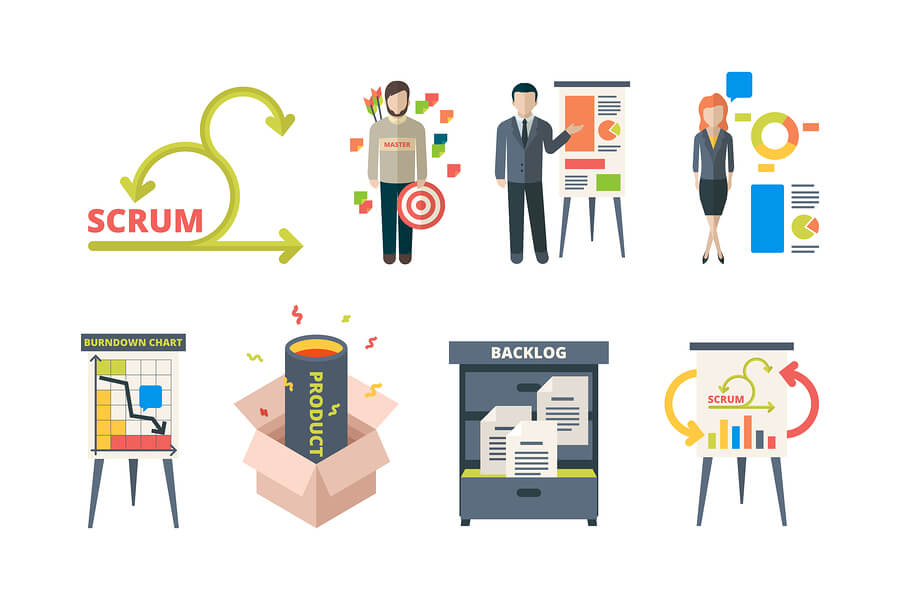
PMP is the most reputable project management certification around the world with nearly one million PMP-certified professionals. PMBOK is the backbone of the PMP certification exam content and the exam questions. Since the project management dynamics, popular frameworks, and trends are changing, PMBOK must be relevant to the changing dynamics of the project management profession as well. That is the main reason why PMP certification PMBOK is changing every three to five years.
Watch Alan’s “New” PMP® Exam Journey Interview
What is changing in PMBOK Guide – Seventh Edition
If you would ask me to summarize what is changing in PMBOK Seventh Edition in one sentence, I would say
PMBOK guide 7th Edition will be based on principles rather than processes and it will be much shorter than the current edition.
Depending on the project characteristics, industry, requirements of the stakeholders, and organization, project managers tend to apply different approaches when delivering projects. These approaches can be predictive, agile, hybrid, or waterfall. The important point is, that project management standards must not be favoring one approach over another. Project management standards must focus on successful projects and value delivery.
Watch our “What is changing in PMBOK® Seventh Edition?” video
Principle vs Process-Based Project Management
In PMBOK Seventh edition, project management standards will be principle-based rather than processes. There are PMBOK knowledge areas in current and previous PMBOKs and each knowledge area has processes, inputs, tools, techniques, and outputs. These processes will not be available in the PMBOK Guide Seventh Edition. There will be principles that are generally accepted and practiced in project management. While current and previous PMBOK editions were focused on deliverables, evolving project dynamics focus on overall project outcomes and new PMBOK will focus on outcomes rather than deliverables.
This does not mean that process-based approaches are not relevant or useful anymore. Many organizations and project management practitioners continue to use conventional project management delivery methods. Conventional approaches remain relevant in the context of PMBOK Guide Seventh Edition as well.
In PMBOK 7th Edition, projects do not only produce products or deliverables. Projects deliver outcomes and these outcomes bring value to the organization and its stakeholders.
Visual Summary of PMBOK 7th Edition Changes
Based on PMBOK 7th Edition exposure draft and PMI announcement following are the changes from PMBOK 6th Edition to PMBOK 7th Edition.
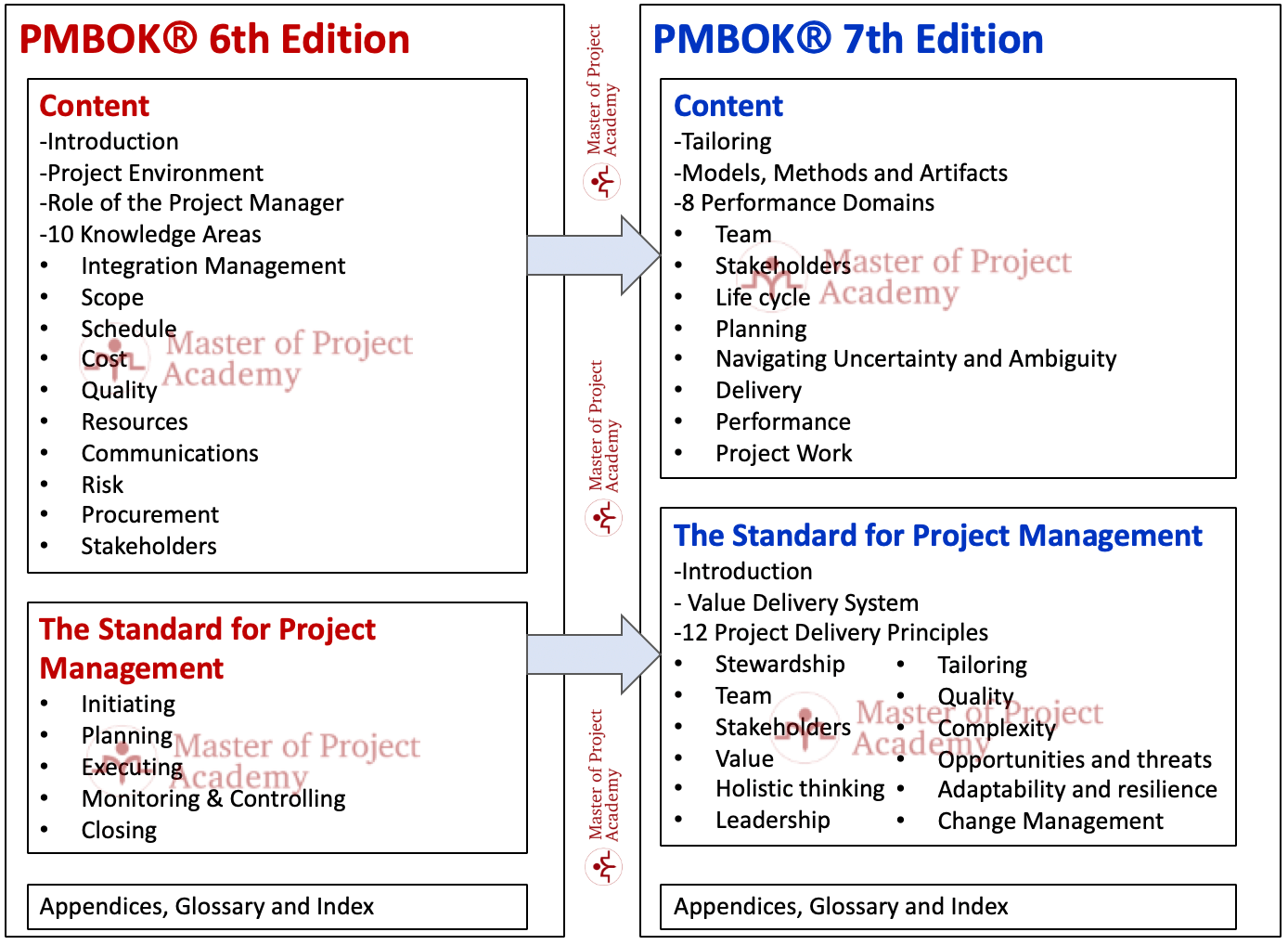
There are three introduction chapters in PMBOK and then 10 knowledge areas in PMBOK 6th Edition. In PMBOK Guide Seventh Edition, instead of knowledge areas, there will be performance domains. There will be Tailoring, Models, Methods, and Artifacts chapters as well.
PMBOK 6th Edition has five project management process groups: initiating, planning, executing, monitoring & controlling and closing. These are referred to as the five stages of a project lifecycle as well. For each knowledge area, there are processes belonging to these process groups. For instance, the estimate costs process is a process belonging to the planning process group and cost management knowledge area.
In PMBOK 7th edition, there will be a shift from the process-based approach to the principle-based approach. There will be 12 Project Delivery Principles and a Value Delivery System. The Value Delivery System will focus on delivering valuable outcomes rather than deliverables. Projects are fundamental components of the Value Delivery System and principles will guide the Project Managers, Team Members, and stakeholders on how to achieve intended outcomes to deliver value to the organization and stakeholders.
Value Delivery System
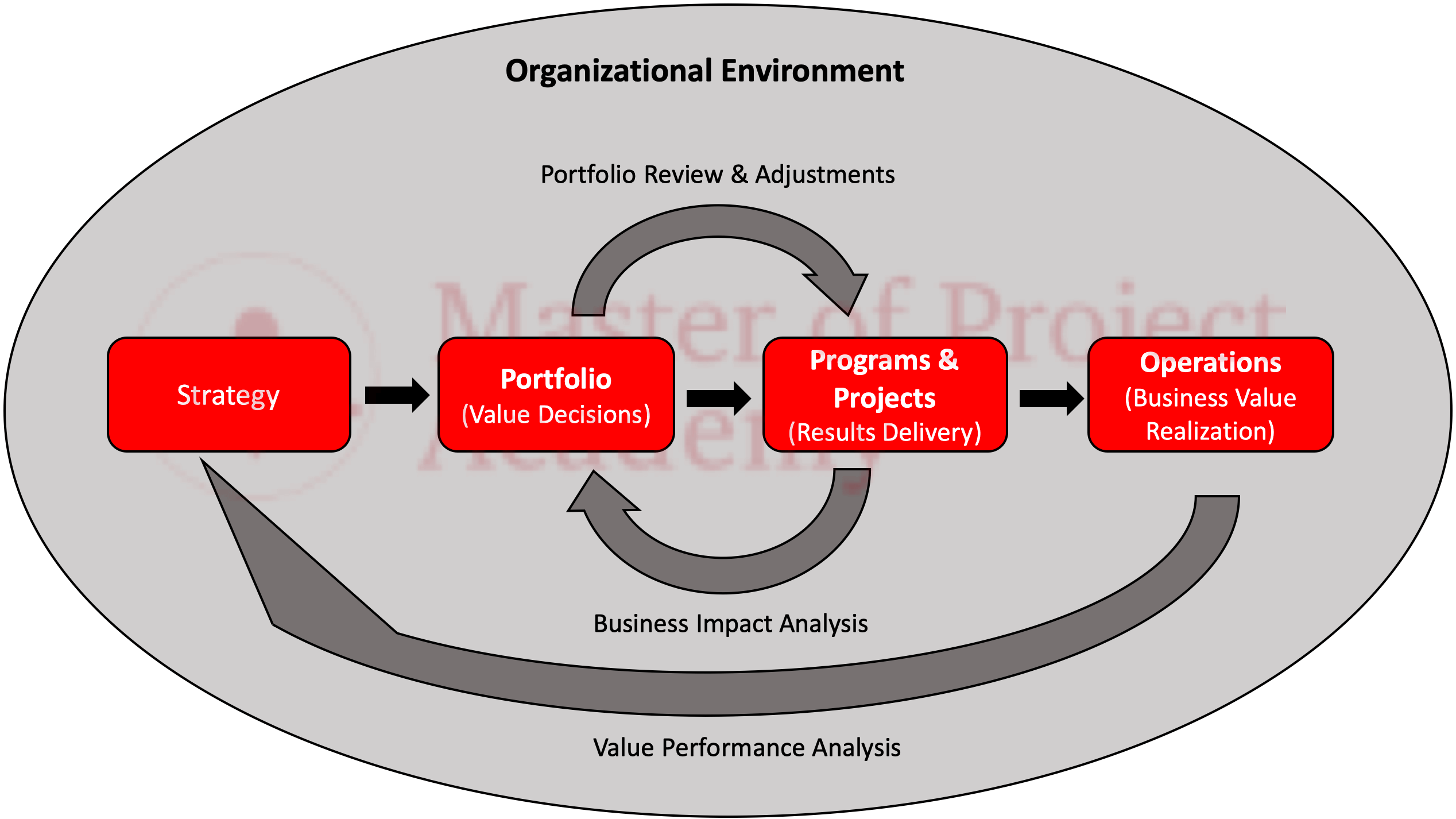
The figure above shows the “Value Delivery System” approach coming with PMBOK 7th Edition. Based on this system, strategies, missions, or objectives of an organization decides the next portfolios or investments. Portfolios can include sub-portfolios, programs, or projects. To ensure the objectives of the portfolios, program and project delivery must reach its intended targets. Based on the outcomes of the projects, business impacts are analyzed and portfolios are reviewed or adjusted for future steps.
Once the projects are delivered successfully, expected business values must be earned for the organization as well. This is called “Business Value Realization”. Based on the realized business values and outcomes of the delivered projects, organizations derive their strategy to initiate new portfolios.
Project teams can produce outcomes by using different delivery approaches. For some projects, activities might be clear and the results can be achieved by completing the activities. However, for some projects, there might be ongoing activities, monitoring and elaborating the outcomes of previous activities to determine the next steps in the project. “Project management” might not be an appropriate term for some projects. Therefore, “project delivery” is used instead of “project management” in PMBOK 7th edition to cover outcomes as well as deliverables of a project.
Project Delivery Principles
There will be 12 principles in PMBOK 7th edition and these principles define the “what” and “why” of the project delivery. Project delivery principles describe a fundamental truth, norm, or value and are not prescriptive. In order to ensure the intended outcomes of the project delivery, project team members must follow these principles. The following are the 12 principles.
![]()
1-) Stewardship: Be a diligent, respectful, and caring steward.
2-) Team: Build a culture of accountability and respect.
3-) Stakeholders: Engage stakeholders to understand their interests and needs.
4-) Value: Focus on value.
5-) Holistic Thinking: Recognize and respond to systems’ interactions.
6-) Leadership: Motivate, influence, coach, and learn.
7-) Tailoring: Tailor the delivery approach based on context.
8- ) Quality: Build quality into processes and results.
9-) Complexity: Address complexity using knowledge, experience, and learning.
10-) Opportunities & Threats: Address opportunities and threats.
11-) Adaptability & Resilience: Be adaptable and resilient.
12-) Change Management: Enable change to achieve the envisioned future state.
New Platform Coming with PMBOK Seventh Edition: The Standards Plus™ Interactive Digital Content Platform
The Standards Plus™ interactive digital content platform will be linked to PMBOK 7th Edition via the Models, Methods, and Artifacts section. This platform will reflect “how to…” about current, emerging and future practices, methods, artifacts, and other useful information. Standards Plus aims to start with ITTOs from PMBOK Sixth Edition and incorporate new resources since the project management is evolving.
Visual from PMI Regarding Changes from the PMBOK 6th Edition to the PMBOK 7th Edition
PMI recently shared the following visual regarding the changes from PMBOK 6th to 7th Edition.
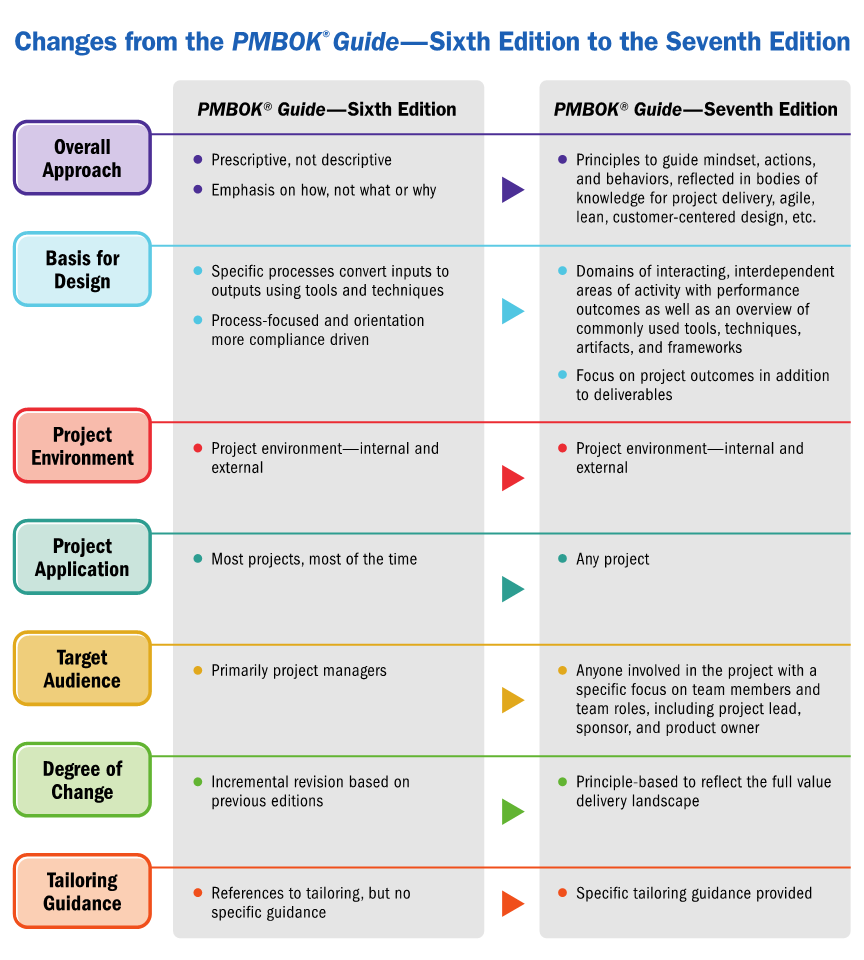
How is PMBOK® Updated?
Following is the six-step followed by PMI to update PMBOK.
- PMI charters a volunteer committee to develop or update a standard.
- The volunteer committee drafts and/or refines an existing standard.
- A group of subject matter experts review initial drafts of the standard and provide feedback to the committee.
- The committee revises the draft standard and prepares a document for public review and comment. The committee considers input from the public and may revise the standard in response. -> We see the PMBOK exposure draft at the end of this step.
- The final standard is presented the PMI Standards Consensus Committee which consists of volunteers from the profession for final validation.
- The new standard is submitted for approval by the PMI Director, Standards & Publications before it is released
PMBOK Seventh Edition exposure draft has been published for public review and comment on 15 January 2020 and review/comment was available until 14 February 2020. Based on the reviews and comments, PMI will be working on the development of PMBOK 7th Edition. The planned release date for PMBOK Seventh Edition is August 1st, 2021.
Summary of PMBOK Seventh Edition Changes
We have gone through the exposure draft of PMBOK 7th Edition and PMI announcements to review what the changes will be in PMBOK 7th Edition. The biggest change is the shift from “process-based project management” to “principle-based project delivery”. Instead of processes, inputs, outputs, tools, and techniques, project delivery focuses on principles and outcomes.
Knowledge areas will not be existing in PMBOK anymore. There will be performance domains. There will be a new digital platform: Standards Plus linked to PMBOK. This platform will show current, emerging, and future project delivery practices for the use of project practitioners.
PMI is planning to release PMBOK Seventh Edition by August 1st, 2021. You can read about the previous July 2020 changes in our PMP exam changes post. The latest change to the PMP exam happened on Jan 2nd, 2021.
The PMBOK 7th Edition has radical changes and a big change from waterfall project management techniques to agile and holistic project delivery methods. We recommend preparing and sitting for the PMP exam before the changes. You can attend our PMP training before the changes.
- Are you thinking about how to learn Power BI? Check out the new Power BI certification courses:
